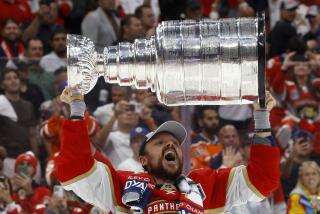Pahlsson proves to be more than a top defender
Samuel Pahlsson is a finalist for the Selke Trophy, awarded annually to the NHL’s best defensive forward.
His playoff performance suggests that had his career taken a different turn, he might have contended for the Rocket Richard Trophy, awarded to the league’s top goalscorer.
Like most young hockey players, Pahlsson dreamed of scoring goals, not preventing them. Goalscorers get the big bucks and the fame. Checking forwards usually go unnoticed, except for occasional sweaty handshakes from grateful teammates.
But somewhere on the journey that took him from his hometown of Ange, Sweden, to Boston and on to Anaheim in a trade during the 2000-01 season, Pahlsson was told to concentrate on defense. He not only made his peace with it, he has thrown himself wholeheartedly into a job that’s utterly vital during the playoffs, when an unfinished check or a pass allowed to find its intended target can spell the difference between celebration and elimination.
“I wanted to be a goal scorer, for sure. Everybody wants to be a goalscorer,” Pahlsson said. “I wanted to be that too, but there are a lot of guys who are better than me at scoring goals.”
You could have fooled the Ottawa Senators on that point.
In fact, Pahlsson did just that Wednesday, scoring in a 1-0 victory that gave the Ducks a prohibitive 2-0 lead in the Stanley Cup finals.
It wasn’t a lucky shot, bouncing in off a leg or a skate.
It was a goal scorer’s goal, made possible by the defense-first instincts that have made Pahlsson as valuable a player as any on the Ducks this spring.
Pahlsson centers for Travis Moen and Rob Niedermayer on the Ducks’ stopper line, whose job is to neutralize opponents’ top scorers. All three are big and bruising and revel in a never-give-up mentality that helps them win battles along the boards and withstand punishment around the net.
The trio did a fine job silencing the Senators’ top line of Jason Spezza, Dany Heatley and Daniel Alfredsson in Game 1 -- so good that Coach Bryan Murray occasionally took Alfredsson off that line Wednesday in an effort to mix things up.
With Pahlsson winning 10 of 12 faceoffs and his line recording 11 hits, carrying out their defensive assignment in Game 2 would have been accomplishment enough for the trio.
But the biggest stopper didn’t stop there.
With the game apparently grinding toward overtime and the lively, standing-room-only crowd of 17,258 imploring the Ducks to find a way to beat a sharp Ray Emery in Ottawa’s net, Pahlsson stepped in front of Heatley and stole the puck. He dashed up the wing and took quick stock of the situation.
“I tried to step in and shoot between the legs of the defenseman,” Pahlsson said.
“I didn’t see it go in because he was in the way.”
The “he” in question was former King Joe Corvo, and Pahlsson’s shot went through his legs like a croquet ball through a wicket at 14:16 of the third period, Pahlsson’s third goal of the playoffs and second game winner.
Moen -- who had the decisive goal in the Ducks’ 3-2 victory Monday -- Pahlsson and Niedermayer have combined for five game winners and 12 of the Ducks’ 46 playoff goals.
“I play my role and get a goal here and there,” Pahlsson said.
In the here and now it was monumental. Since the Cup finals went to a best-of-seven format in 1939, only three teams have squandered a 2-0 series lead in the finals, and only the 1971 Chicago Blackhawks have failed to win the Cup after winning the first two games at home.
“This guy, you don’t notice how good he is if you don’t see him on a daily basis,” teammate Teemu Selanne said of Pahlsson. “He’s a warrior all the way. He has all the tools. He could play on the first line if he wants.”
That’s lavish praise for a Finn to bestow upon a Swede. The two countries don’t always get along; their rivalry intensified when Pahlsson and Sweden defeated Selanne and Finland for the gold medal at the 2006 Turin Olympics.
“He’s my favorite Swede by far,” Selanne said.
“I think he wants to be a Finn, though. That’s why I like him even more.”
Moen joked that Pahlsson is so tough he could have spent his formative years in the famously rugged Western Hockey League, which sent Moen, Niedermayer and countless other players to the NHL.
“He might play a little more physical than us,” Moen said. “Sammy, I would say, is a Western Leaguer, for sure.”
Pahlsson, one of four Ducks remaining from the 2003 team that lost a seven-game final to New Jersey, stopped short of saying the Ducks had a significant advantage over Ottawa.
“Of course, we’re happy with 2-0. It’s what we wanted,” he said. “But it’s going to be a different game up there. They’re going to have their fans backing them and pushing them and they’re going to have the last change and the home-ice advantage, so it’s going to be tough.”
Not too tough, though, for the stopper who knows how to start the Ducks’ offense rolling.
--
Helene Elliott can be reached at [email protected]. To read previous columns by Elliott, go to latimes.com/elliott.
More to Read
Go beyond the scoreboard
Get the latest on L.A.'s teams in the daily Sports Report newsletter.
You may occasionally receive promotional content from the Los Angeles Times.







